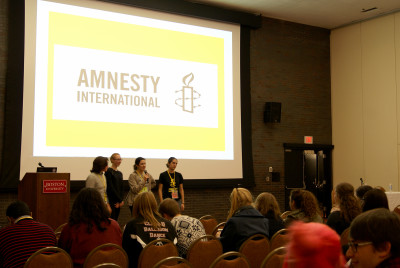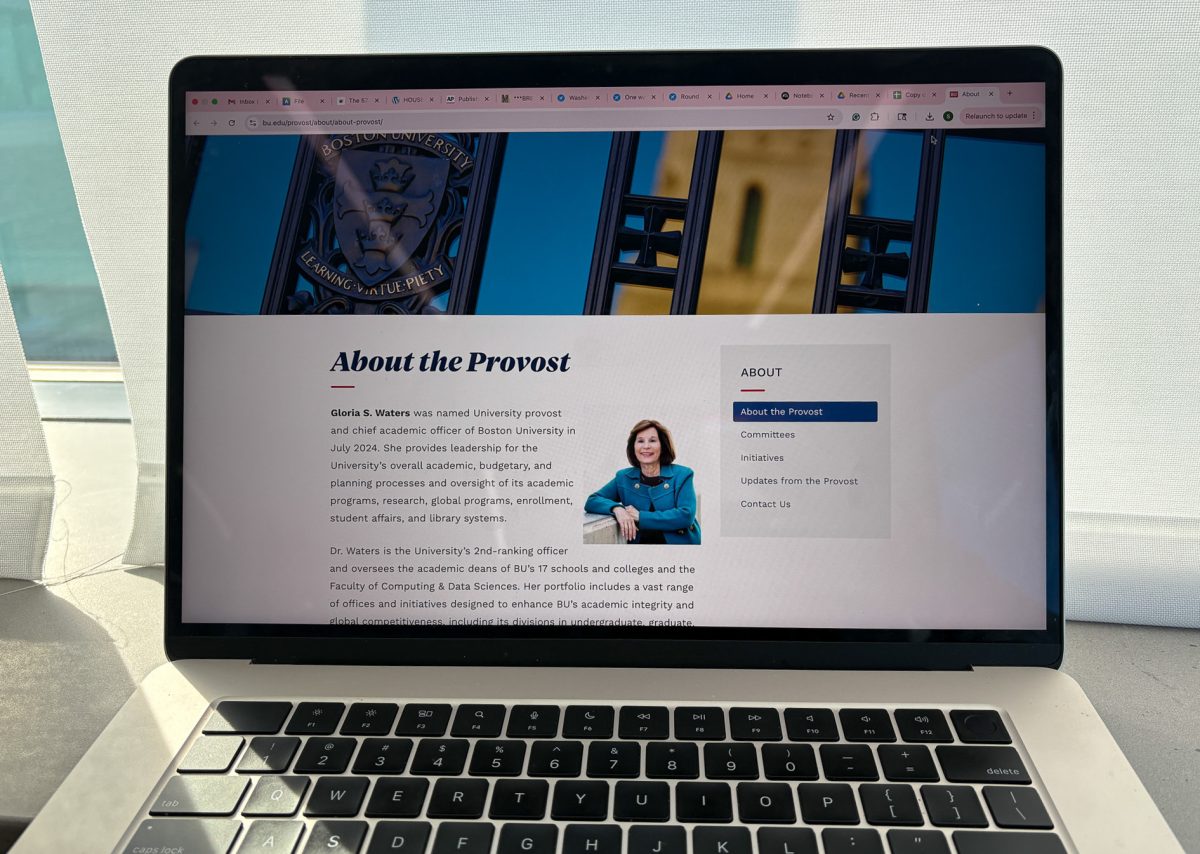
Approximately 100 people gathered at a letter-writing social hosted by Amnesty International’s Boston leadership and Boston University’s Amnesty chapter Friday evening at the Hyatt Regency Hotel, Cambridge. The gathering, dubbed “Write for Rights” encouraged attendees to write letters against global human rights violence and to demand officials address 12 featured cases.
In tables of 10 people, local Amnesty group members, student activists and activists from around the United States sat and wrote solidarity messages in support of victims of the featured cases. The letters will then be sent to officials who will potentially have the power to resolve the addressed human rights abuses, Amnesty Associate Campaigner Emily Walsh said.
The cases range from forced marriage in Burkina Faso, oppressed freedom of speech in Malaysia to Albert Woodfox’s over four-decade solitary confinement in Louisiana.
“[Attendees] can sit down and use the power of their written words to make a change in someone else’s life and start being engaged in this movement,” Walsh said during the event, “and the power of writing a letter, 50,000 [or] 100,000 [or] 1,000,000 letters around the world, that creates a movement.”
Write for Rights has garnered 8,981 pledges to write letters for human rights justice with a goal of 15,000 letters to send from the U.S., Walsh added. The movement has produced successful cases, one of which resulted in the release of 16 year-old Nigerian Moses Akatugba from imprisonment for a robbery he did not commit.
BU Amnesty, a recently confirmed official student group by BU Students Activities Office, co-hosted the event. Being a co-host to a widely recognized event becomes a learning experience and networking opportunity for the organization, BU Amnesty President Sofie Engen said.
“As we are a new student group we are still working on establishing our presence on campus and raising more awareness about AI, therefore speaking to other groups [at the event] who have been through this process before will be very helpful in planning our year,” Engen, a sophomore in the College of Arts and Sciences, wrote in an email. “Hopefully more BU students will join our student group.”
Engen said, “there’s very little focus about human rights in general on campus” and aims to inspire and raise awareness about human rights now that Amnesty has been officially recognized as a student group.
BU Amnesty was denied application by SAO in early October due to a “not clear enough” goal, The Daily Free Press reported. SAO’s decision was later overridden when Assistant Dean of Students John Battaglino contacted Engen and officially confirmed BU Amnesty, Engen said during the event.
The write-a-thon was also a kick-off to the annual Amnesty International Northeast Regional Conference held at the George Sherman Union Saturday. With a theme of “From Moment to Movement,” the conference facilitated dialogues with human rights experts on pressing issues around the globe as well as shaping the organization’s policies.
Cynthia Gabriel Walsh, Amnesty senior organizer and field organizer at the Amnesty International Northeast Regional Office, said the conference had always been held at BU for the past several years. Having a “solid undergraduate student group” at BU after four years establishes a new and exciting relationship for BU and Amnesty, Walsh said.
“Having the presence of BUAI is really important to the fact that we do host our conference at BU,” Walsh said at the event. “It’s just nice to know that [BU] is supporting us outside of just us being in a contractual relationship with hosting a conference.”
Several attendees said the letter-writing allowed them to contribute real action to pressing human rights issues and broaden their horizons on opportunities to engage in other Amnesty activities.
Glenn Dansker, 60, of Cambridge, wrote a letter of support for young girls in Burkina Faso. He said the letter symbolizes that he “stands up for the victims” because the country’s law does not and the community does not care.
“You read about all the injustice and then you turn the page and you’re on to the next thing and you got to stop and try to do something every once in a while,” Dansker said “[Letter writing] is a small thing and you just got to make your time to do it.”
Linda Kim, a junior at Boston College, said the event opened her eyes to the fact that severe human rights violence is also present in the United States and even close to the City of Boston.
“A lot of people think that a lot of these injustices are really apart from U.S. and I think that’s very wrong,” she said. “Those [cases] are just insane and there are also all these [injustices] in our area and we are not aware of it.”
Nawal Wasif, a senior at Brookline High School and a student activist coordinator at AI, said she encourages students to start engaging in advocacy at a young age.
“[High school students] don’t really look beyond what else they can do to be a good civilian,” she said. “College is not the only place you stop and continue your studies. You can do more and use your education as something to help other people.”
























































































































